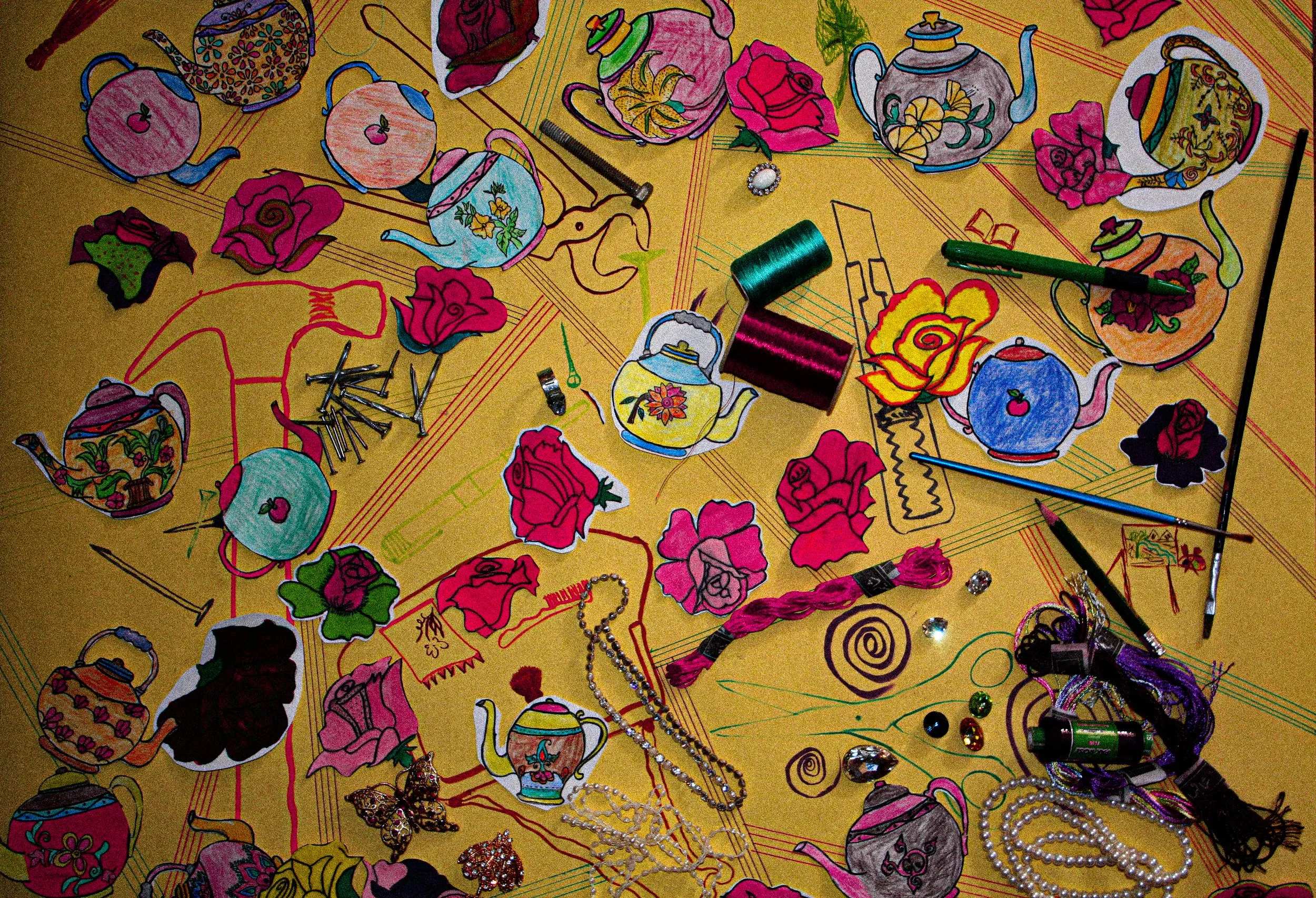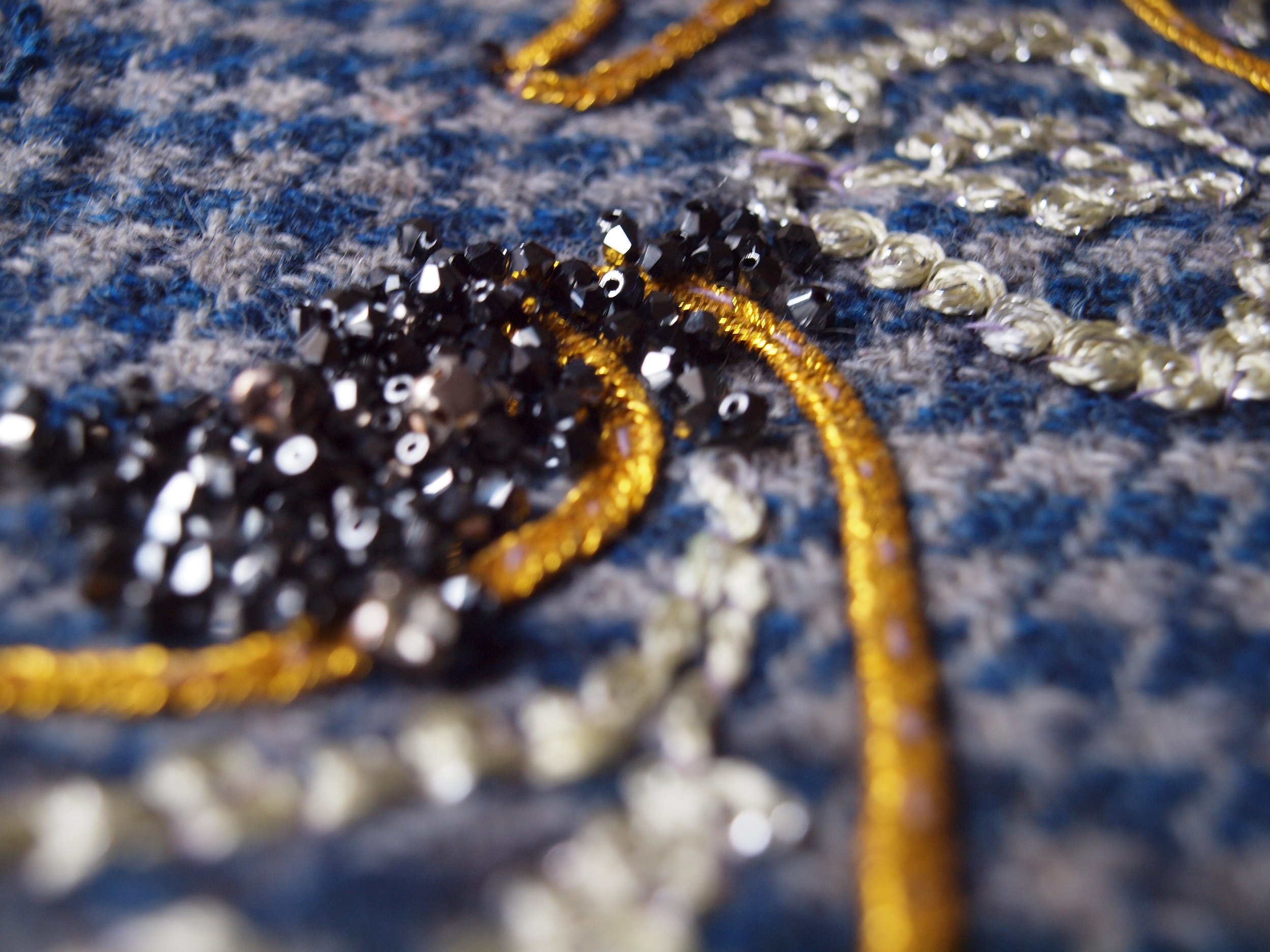تصَوّر (Tasavuur) Imagination
دکان (Dukaan) Shop
دھند (Dund) Fog
جَہیز (Jahez) Dowry
بَہار Bahaar (Springtime)
Hand embroidered on Harris Tweed
اِشْتِراک (Ishriraak) Collaboration
مخصوص (Makhsuus) Specified
Adil’s role is that of a creative facilitator who acts as a catalyst, bridge and mediator throughout the process. This ‘facilitation’ indicates that Adil guided and encouraged the women throughout the making process and his intention was to give the makers more ownership. His insider and outsider positionality gave him wide-ranging perspectives on how to approach the female embroiderers. Additionally, he was situated as the outsider within Chitral, which gave him multiple entry points that guided the facilitation process. The project was developed in a manner that would unpack multiple layers of cultural expressions from both Outer Hebrides and Chitral valley. Themes such as traditional songs; folklore; cuisine; kitchen items; weddings; and everyday objects set the background for a dialogue and inspiration with the local women.
ماضی (Mazi) The past
اقبال (Iqbal) confession
Weaving Songs by Donald S Murray, Hand Embroidered on Calico by Taiba, (2012)
اَفْسانَہ (Afsana) Fable
گواہی witnessing the birds
There is a continuous harmony in an echo; a gathering emerges through the whistles of the unknown. These hums run parallel to the modern world that I inhabit. My intellectual ability is a suffering of being alive. Yet I give this intellect permission to control me. When I close my eyes, I breathe and listen to this gathering. There is a testimony of another world.
For a brief moment, I am transported to a realm of these birds, whom I don’t belong to, but my heart, body, mind and soul start healing for a minute. There is silent care in the act of listening to their melodies.
Each soundbite manifests various human emotions but also sentiments that remain unfamiliar. This submersion, inaccuracy and yearning are what humans experience from time to time. This requires letting go. A profound cultivation occurs within me.
قصیدَہ (Qasida) poetry eulogizing a person
ذِکْر Embroidered Suitcase
تَحْرِیر (Tahrir) Writing
کِیمِیا (Kimiyaa) Alchemy
عالَم (Alaam) the world
صَنْعَت (Sanat) Craft
Embroidered outline on Harris Tweed
The tweed, a tactile material carried the aroma of Hebridean moorland; the chants of the loom encapsulated the stories of everyday life; the colours and patterns celebrated the life force of community; and its coarse texture echoed the endurance and vitality of human existence
Mehria drew parallels between the images of the blackhouses and her present-day kitchen store where they store teapot jugs, lanterns and steel boxes to store rice and flour. Mehria’s narrative emerged when she started to describe her everyday activities. These included washing the dishes; making chapatti and Lassi. Mehria’s mother and sisters would get up at crack of dawn, pray and then prepare to make traditional Chitrali bread. Her mother would recite a special prayer when kneading the dough and always started with Bismillah ( "In the name of God…”). This was to give Barakat (blessing), which brought positivity, health and wellbeing to the entire family.
Blackhouse in Lewis
The traditional motifs of the Chitrali rug carried reminiscences of her ancestors who moved through the highlands of Central Asia and East Turkistan. The garish colour arrangement embodied Mehria’s childlike imagination and wonder. As a result, the lines of threads in her artwork traced their idle chatter of domestic life, enmeshed with the woven threads of the Harris tweed, is an encountering of multiple places that Chitrali women inhabit.
تلَاطم (Talatum) ebb and flow
بشارَت (Basharat), Glad tidings
Pan is piece of plain wood or mantle paced above the fireplace (normally situated in the corner of the wall) of the guest room (anguti) where guests put their belongings while seated for rest. Panpush is a piece of embroidered cloth put over the pan for decorative purposes.
"To see is to have colours or lights before one, to hear is to encounter sounds, to feel is to come up against qualities” Merleau-Ponty





























